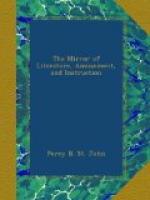* * * * *
GREAT SEAL OF ENGLAND.
The Great Seal itself, when not in the king’s own custody, was entrusted to the “Chancellor,” whose salary, as fixed by Henry I., amounted to five shillings per diem, besides a “livery” of provisions. And the allowance of one pint and a half, or perhaps a quart of claret, one “gross wax-light,” and forty candle-ends, to enable the Chancellor to carry on his housekeeping, may be considered as a curious exemplification of primitive temperance and economy.—Quarterly Rev.
* * * * *
The good people of Weimar appear to be most enthusiastic lovers of music, affording strong proofs of melomania. Every householder of any importance subscribes an annual sum to a band of musicians, who go round in long cloaks to each house, singing fugas and canons, unaccompanied by instruments, in “the most beautiful and correct style imaginable,”—something, we suppose, in the style of the Tyrolese minstrels.—Ibid.
* * * * *
TRAVELLING.
A friend of ours recently went to Russia by steam, and actually breakfasted in Moscow the thirteenth morning after he left London. There is now, he says, a road as good as that to Brighton over three parts of the distance between St. Petersburg and Moscow—what a change from 1812!—Ibid.
* * * * *
SPIRIT OF THE PUBLIC JOURNALS
* * * * *
THE MURDER HOLE.
An Ancient Legend.
“Ah,
frantic Fear!
I see, I see thee near;
I know thy hurried step, thy
haggard eye!
Like thee I start, like thee
disorder’d fly!
COLLINS.
In a remote district of country belonging to Lord Cassillis, between Ayrshire and Galloway, about three hundred years ago, a moor of apparently boundless extent stretched several miles along the road, and wearied the eye of the traveller by the sameness and desolation of its appearance; not a tree varied the prospect—not a shrub enlivened the eye by its freshness—nor a native flower bloomed to adorn this ungenial soil. One “lonesome desert” reached the horizon on every side, with nothing to mark that any mortal had ever visited the scene before, except a few rude huts that were scattered near its centre; and a road, or rather pathway, for those whom business or necessity obliged to pass in that direction. At length, deserted as this wild region had always been, it became still more gloomy. Strange rumours arose, that the path of unwary travellers had been beset on this “blasted heath,” and that treachery and murder had intercepted the solitary stranger as he traversed its dreary extent.




